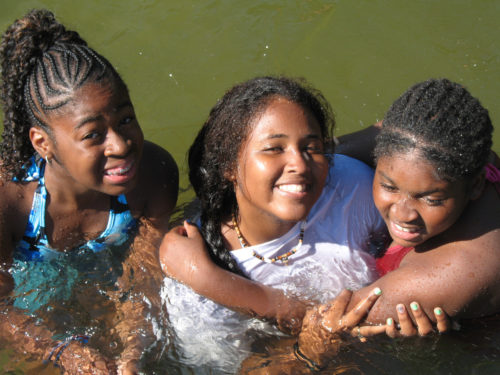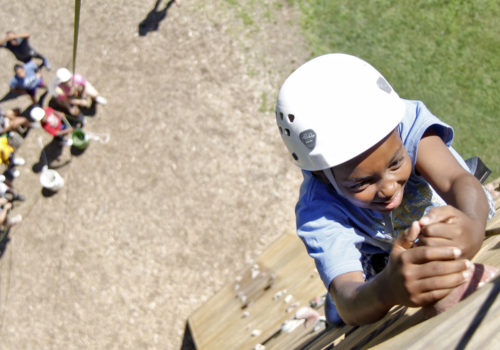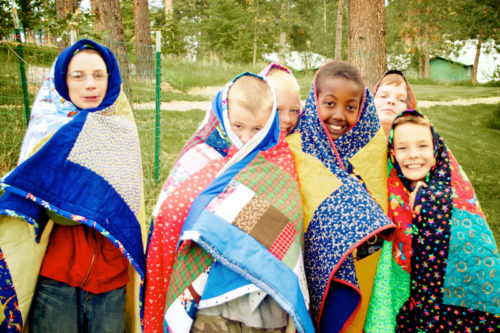Programs offer summer fun and support for kids in needPosted Aug 13, 2012 |
|

Seventeen-year-old Priscilla Alcantara, center, enjoys a swim with some of the students she helps supervise in the Diocese of Massachusett’s B-SAFE program.
[Episcopal News Service] It was the first day of the summer B-SAFE Program in the Episcopal Diocese of Massachusetts, and one girl in Priscilla Alcantara’s group kept wandering off, unwilling to talk to the other sixth-graders because her friends were in a different group. Alcantara, a teen staff member, asked if she wanted to talk to her instead.
Alcantara, 17, stayed with the girl and helped her meet the other kids. “I just feel like, if I didn’t talk to her, she would never have met new people. … But she noticed that they were just as nice as her friends, so she made new friends.”
Shy youngsters have been making friends for 13 summers at the Bishop’s Summer Academic and Fun Enrichment Program, which serves 625 elementary and middle-school children and 125 teen counselors-in-training and staff in eight locations in the Boston area. Four days a week, the youngsters attend morning academic programs followed by lunch, reading time and afternoon field trips to parks or cultural institutions. Fridays, they take day-long field trips outside the city, usually to a farm, park, lake or beach.
Spearheaded by St. Stephen’s, an Episcopal mission church in Boston, B-SAFE partners with 52 Episcopal churches and about 1,000 volunteers to provide lunches, field trips and other assistance. The summer program complements a year-round after-school enrichment program for students that includes leadership training and college and career mentoring for teens. Funding comes from the diocese, donors and foundation grants. A city jobs program refers most of the teens who form the summer staff; many attended the enrichment programs themselves.
The children and teens come from the neighborhoods around the program sites – mostly Episcopal churches – and reflect those neighborhoods: often living in public housing in families receiving public services, attending underperforming public schools, sometimes coming from foster homes or involved with the court system, said the Rev. Liz Steinhauser, St. Stephen’s priest associate and director of youth programs. They represent varied cultural and religious backgrounds. “The majority of the kids that we’re working with would not have a summer program to go to” without B-SAFE, Steinhauser said.
The Boston program is among Episcopal initiatives, many of them at diocesan camps, spanning the country that offer summer fun and enrichment to youngsters who might be unable to afford them otherwise. Some provide general scholarship aid; others target particular populations, such as children with incarcerated parents.
The B-SAFE and year-round Boston program help make city Episcopal churches relevant and build connections within neighborhoods and between urbanites and suburbanites, Steinhauser said. “By figuring out a way to bring suburban volunteers together with urban young people, we’re serving the body of Christ. We’re making the connections between churches that wouldn’t otherwise have the opportunities to interact.”
The programs help bridge the education gap between poorly funded urban and wealthy suburban schools. Research shows that the biggest gap occurs because of the educational offerings children in the wealthier districts receive outside school and during the summer, Steinhauser said.
Participating teens benefit from meaningful jobs, training around issues such as healthy relationships and bullying, and the chance to visit colleges and receive mentoring.
Michael Cordero, 16, entered the St. Stephen’s program as a third-grader and now is a staff member working with third- and fourth-graders for the summer.
“St. Stephen’s just kind of opened up … a whole new world,” he said. “The neighborhood I’m in, it’s not bad. It just doesn’t have as many opportunities as it should.”
St. Stephen’s has given him a job, the chance to see and learn new things and just be himself, he said. “When I was little, I always wondered: Why are they so nice? They’re not being nice; they’re just kind of being them. … Since I’ve been here so long, it’s not hard for me to be nice. It’s just easy for me to give back.”
Alcantara said it had opened doors for her as well, including involving her in community organizing and service during the school year. Last year, that included reopening a greenhouse at a local school. The program is “part of the community, so they try to better everything around me,” she said.

A boy tries out the climbing tower at Camp Bob at the Episcopal Kanuga Camp and Conference Center near Hendersonville, North Carolina.
Residential programs
While the Massachusetts program is a day- and after-school enterprise, except for a four-day camp trip for 120 of the oldest participants, some programs offer children in need a week away at an Episcopal camp.
The Kanuga Camp and Conference Center near Hendersonville, North Carolina, began holding outreach residential camps for needy children in 1988, when it hosted homeless children from Atlanta. The initiative grew into Camp Bob, which launched in 1998 and will serve about 800 campers this year, most attending for free thanks to funding from grants, parishes, after-school programs and Kanuga’s scholarship fund, said Gary Woodhurst, Camp Bob program director. One week focuses specifically on children with a parent in the military-deployment process; another – called Camp Hope – on children with one or both parents incarcerated. Camp Bob runs concurrently with Camp Kanuga’s regular summer sessions.
“We do some specific [counselor] training for our population of campers, but really a lot of the stuff we use is interchangeable with any camp training,” Woodhurst said. In fact, one counselor who spent two weeks at Camp Kanuga said he’d expected those campers to be better behaved but discovered the opposite.
During Camp Hope, he said, “We definitely work on having campers feel like this is a safe place to share what they’re going through. A big part of this week … is talking about it and helping the children understand their situation in that they are still loved as who they are – their parents still love them. Trying to help whatever fractured relationship they may have with their parent who is incarcerated is definitely part of this week.”
On Aug. 1, Miss America Laura Kaeppeler, whose father served 18 months in federal prison for mail fraud and whose pageant platform is mentoring children of incarcerated parents, visited the camp.
Camp Bob gives children new experiences and responsibilities. “They’re given more opportunities to try new things in a week than they may ever get within a year at home,” Woodhurst said. “A lot of the campers who come here, it’s been their first time on an interstate.”
The camp also is a break from whatever circumstances they face at home. “We do see a lot of campers who are surprised that they’re guaranteed three meals every day,” Woodhurst said.
Campers attend a daily chapel service, focusing on themes of trust, hope or love. During Camp Hope, they also attend a Friday Eucharist. “They do devotions at night in cabins. That’s the time for the counselors to get with their campers and encourage them to open up and encourage them to pray and share with their cabin mates.”
Joe Seddon, head male counselor, said he believed the devotions time was the most important, when “we can start unpacking the invisible backpacks that the camper has on.
“I think just being able to vent … and realize that there is someone there to listen is a wonderful thing. I’m sure many of these children live in situations where they can’t really express their feelings, and if they do they’re told it’s wrong. At Camp Bob, we feel an expression of feelings is a good thing. It’s wonderful when you see a child realize this.”
Seddon graduated from the University of York St. John in England two days before arriving as a Camp Bob counselor. “I wanted to stretch my comfort zone,” he said. “I feel like I could give a lot to the kids, and the kids could teach myself a lot about life as well. I’ve learned an awful lot more than I ever anticipated.”
“The way I look at it is: Every child here has the right to be at camp and has the right to be a child. I just try and offer my services to make sure they have the most fun they could have.”
Camps also carry benefits beyond their borders.
“The number of kids who wind up in prison who have parents who are in prison is quite high,” said Stuart Campbell, executive director of the Galilee Episcopal Camp and Conference Center at Lake Tahoe, Nevada, and its Camp Spirit for children of incarcerated parents. “So to try to break some of that and break that cycle of people going to prison, generation to generation, that’s really what Camp Spirit is all about.”
According to Kaeppeler’s website, children with imprisoned parents are almost six times more likely than their peers ever to be incarcerated.
“I see kids who have become counselors” after being campers, Campbell said. “I think they’ve started to make that break, realizing that there’s another way out there … a different way to behave than being a criminal.”
Camp Spirit serves 20 to 35 kids ages 7 to 10. As these campers get older, they can join the regular Camp Galilee sessions and sometimes later become counselors.
During the other camp sessions, many children also come from disadvantaged backgrounds, Campbell said. “Nevada’s been really hit hard by the financial situation in the country in the last couple of years.” He estimated that more than 40 percent of Camp Galilee campers received at least some financial support. About 40 Hispanic campers come on full scholarship from two parishes in Las Vegas.
Camp can make a big difference to disadvantaged children, Campbell said. “Some of these kids come from such troubled backgrounds that just to be around people who care for them for a week and treat them in a compassionate way can mean the world to them.”
Being in a beautiful camp setting eating three healthy meals a day also can be a big change for inner-city children living in food deserts, he said.

Children at Grace Camp, a camp in the Episcopal Diocese of Montana for youngsters with incarcerated parents, each receive their choice of a handmade quilt when they arrive.
Feeling God’s love
“My hope is that they go home feeling like they were part of some kind of positive, compassionate community within which they learned more about what it means to treat each other in a loving manner,” Campbell said. “We also want the kids to learn more about themselves, maybe discover or learn a new skill while they’re here, a new talent – realize that they’re creative and intuitive people, and they’re good at certain things.”
At Grace Camp – a one-week, full-scholarship camp for children of incarcerated parents in Montana – campers go home with a tangible sign of that sort of caring and compassion: a quilt created by women in the diocese. They also receive a backpack full of odds and ends they need for camp, such as sunscreen, shampoo and a water bottle. And staff provide extra supplies as needed, such as if they arrive without toothpaste or underwear, said Julie Sisler, site manager for Camp Marshall, the Episcopal Diocese of Montana camp that includes Grace Camp.
Over time, staff have learned how to make things run more smoothly at the seven-year-old Grace Camp, which now more closely resembles a regular residential camp, said Sisler, who also runs the camp music ministry. They keep the staff constant during a five-day session instead of giving counselors time off during a six-day schedule, for example, because the youngsters have a harder time adjusting to the changing staff and developing relationships with them.
They call the adjustment period “storming, norming and conforming” as kids first test limits, then accept the rules, Sisler said. “The conforming is when they come to peace with it, and then they can engage fully into the program without pushing limits all the time.”
Campers also settle in more quickly now that many are returning year after year, she said.
Up to 35 third- through eighth-graders attend Grace Camp, and the staff is trying to discern how best to integrate graduates into the high school camp so they don’t feel out of place, Sisler said. “We’ve had marginal success with that.”
As at the Nevada camp, other campers in the regular Camp Marshall sessions also receive financial assistance. “The philosophy is that God will provide,” said Sisler, estimating half of their campers receive at least a partial scholarship. About 450 people, including families, camp at the diocesan facility each summer.
“Our ultimate wish is that they all find Christ and eventually grow up to find a Christian community and thrive in that,” she said. “In reality, what we’re really hoping is that the kids come here and have a great week and feel that God’s loved them, however that can impact them.”
Sometimes, that impact comes in making connections with others from similar backgrounds. One Grace Camp participant, a boy with a father in jail, was “just ecstatic” about his camp experience, telling his mother how much better he felt after attending, Sisler said. “He had always thought that he was the only one like this. Just knowing that he’s not alone just makes a huge difference.”
— Sharon Sheridan is an ENS correspondent.

Social Menu